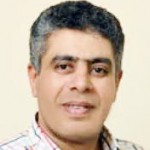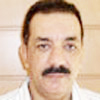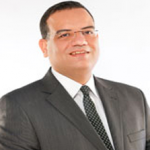Although President Morsy has commenced his first trip to China, which will be followed by a unique trip to Iran, most columnists across Egyptian newspapers have not touched upon the presidential trips. Opinion writers commented on the importance of Morsy’s independence from his Islamist group and some have warned against possible occurrences of violence and bloodshed if the president does not properly represent all Egyptians.
On another note, some writers have dissected the challenges facing liberal forces and the battles ahead down the road. The parliamentary elections and the constitutions, for some commentators, shape the most vital issues to keep an eye on in the coming phase. Otherwise, the tide wave of political Islam will take more solid shapes.
The president’s independence is a national duty
Mohamed Abul Ghar
Al-Masry Al-Youm newspaper

Recalling the recent news of releasing Al-Dostour Editor-in-Chief Islam Afify along with other two editors, Mohamed Abul Ghar attempts to analyze the reasons behind President Morsy’s decision to release the journalists. As a starting point, Abul Ghar believes that the initial charges of ‘insulting the president of the republic,” must have been of the invention of the Muslim Brotherhood lawyers. For him, the scene imitates those repeatedly occurring during Mubarak’s era. Another note would be the general mood of frustration that followed the recent selection of editors of Egypt’s largest newspapers.
The writer believes that the rigid roots behind all major predicaments in Egypt is the belief that the Muslim Brotherhood’s political arm Freedom and Justice Party (FJP) is the winning and ruling party and that it was once led by President Morsy. It is proper that the FJP is the Muslim Brotherhood’s official party, yet that does not signify that Morsy is by any means leading the organization. Therefore, the Muslim Brotherhood should refrain from pushing Morsy into troubles, especially when it relates to the media. Wrapping up his column, Abul Ghar calls upon Morsy to cancel all laws that entail jail sentences for journalists and remain independent from his Islamist group.
Will Morsy conflict with the Salafists?
Emad Al-Din Hussein
Al-Shorouk newspaper

Will we reach a stage when Mohamed Morsy, his Muslim Brotherhood group and the Salafists would describe Muslims who fight militants in Sinai as “Khawarij” (those who rebel against the basic rules of Islam)? Emad Al-Din Hussein wishes to see an end to this extremist thoughtwhich blinds many to realizingthat fighters in Sinai strive to put down the country’s enemies and religion.Backing up his argument, Hussein cites the recent situation of the Salafist figurehead Yasser Borhami when he analyzed the Egyptian militia groups as apparent factions of foreign groups. In Hussein’s estimation, there is a rising conflict between extremists and moderate views that has to be drawn to a close.
The writer then condemns the Salafistidea of naming Muslims who do not abide by the extremist ideology as “infidels.” In politics, one can always delve into debates and arguments, whereas religious wrangles can drown all sides in deep waters. The writer concludes that any solution other than exercising full powers over Sinai will not be a permanent way out of the dangers threatening the Sinai peninsula and its inclusion under Egypt’s sovereignty. The security solution can never draw a dead end to the challenge of Sinai; it will only lead to political and social resolutions that probably will maintain the situation as it is.
A message to the president
Mohamed Essmat
Al-Shorouk newspaper

In his article, Mohamed Essmat sends a message to President Morsy especially after his recent decisions to retire Field Marshal Hussein Tantawi and Sami Anan. He commences his column by announcing that his first pick in the presidential elections was the ex-presidential candidate Abdel MoneimAbulFotouh, believing that both Morsy and Ahmed Shafiqare merely two faces of the same coin.
The writer then lists three chief concerns in which he assessesMorsy’s pitfalls. Revisiting the decision to sack Tantawi and Anan, Essmat criticizes the president’s conviction that the move means ending the military rule in Egypt. He notes that taking out the senior figureheads of the country’s armed forces does not necessarily result in changes in the country’s top economic institutions, which are managed by armed forces officials.
Essmat then condemns the president’s repeated statement as being “the president for all Egyptians.” In his estimation, Morsy will not be able to properly represent all ordinary citizens, regardless of their gender or religion, as long as he does not reveal the sources of his group’s secret funding. The third predicament facing Morsy’s route is his challenge in retaining the stolen wealth gone via Mubarak’s regime. Finally, the writer addresses Morsy and warns him of the importance of proving his will of belonging to the spirit of the 25 January revolution or he will have to start preparing for chaos, violence and bloodshed.
The challenge of the liberal bloc
Mohamed Mosalem
Al-Watan newspaper

The liberal bloc has definitely contributed to the Muslim Brotherhood’s monopoly of power. In his column, Mohamed Mosalem states that the disunion of the liberal bloc offered the Islamist group a golden chance to further unify efforts and ascend to authority. While analyzing the situation, fingers should not only pinpoint the Supreme Council of Armed Forces (SCAF) for facilitating the Muslim Brotherhood from assuming powers. It was only when the military withdrew from leading the country that the liberals started their head on clash with the Muslim Brotherhood, especially after the apparent ‘Ikhwanisation’ of Egypt’s most institutions.
The writer states that if history counts on SCAF’s easy handover of power to the Muslim Brotherhood, documentation will also testify the extent to which liberals have been proven fractured and separated. Mosalem notes that now after Political Islam is on the rise, the civil bloc has two final battles to fight: the parliament and the constitution. The problem is that the liberal forces have not even startedassembling for the coming parliamentary elections or deciding on a draft law that regulates political practices in the elections. Concluding his article, Mosalem notes that probably another important battle is to size down the Muslim Brotherhood position instead of stabbing the country’s liberal powers once more.
Habib Al Adly’s methods
Soliman Gouda
Al-Masry Al-Youm newspaper

Improving the security situation, which has deteriorated since the 25 January revolution, concerns Gouda.
He recalls an incident where a friends’ family was attacked in a Giza neighbourhood after leaving a large shopping mall. After being robbed of their money and car, the culprits then contacted them to ransom back the vehicle. Gouda says dealing with such problems should have been top of the to-do list for the new Government, particularly for the Minister of Interior.
Treating the chronic problem of property offences will require new methods if the new minister is to avoid the shortcomings of his predecessor Habib Al-Adly. Gouda proposes the use of helicopters, as it the practice in ‘most advanced countries’, to fight crime. Although many argue against the practicality of using helicopters to fight crime, Gouda they could be a rapid way of controlling dangerous situations. Another method, he suggests, could be the establishment of a network centre near the Ministry of interior through which urgent messages can be rapidly delivered about potential victims.
Only when such centres are established and his technique is implemented will ordinary citizens feel their country is safe and its police ready to help them, 24/7. These are just a few of Gouda’s ideas and the new Minister of Interior should encourage similar brainstorming from his staff to innovate and develop new security measures.


